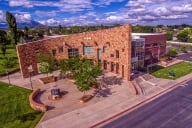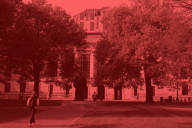You have /5 articles left.
Sign up for a free account or log in.
Thirty-eight percent of college presidents surveyed said their institutions may initiate employee layoffs in the next 12 months, and they anticipate these actions affecting 10 percent of their total workforce, according to a survey of 295 college presidents conducted by the American Council of Education that focused on how institutions have been impacted by the COVID-19 pandemic.
 A smaller percentage anticipate possible furloughs (28 percent) or employee pay reductions (16 percent) over the next year.
A smaller percentage anticipate possible furloughs (28 percent) or employee pay reductions (16 percent) over the next year.
To date, 61 percent of college presidents said their institutions have implemented hiring freezes in response to the financial stresses caused by the pandemic, 54 percent have frozen employee compensation, 35 percent have renegotiated contracts for outsourced services, 31 percent have implemented employee furloughs and 28 percent employee layoffs.
Four percent said they have reviewed or are in the process of reviewing tenured relationships, and 8 percent said they might begin reviewing tenured positions within the next 12 months.
College presidents said their most pressing concerns are the mental health of students, followed by long-term financial viability of their institutions, mental health of faculty and staff, and spring enrollment numbers.
More than half (55 percent) of presidents reported enrollment decreases this fall compared to last fall. Consistent with preliminary data on falling enrollments at community colleges from the National Student Clearinghouse, presidents at public two-year colleges were most likely (79 percent) to report enrollment decreases. About half (51 percent) of public university presidents reported decreases in out-of-state enrollment, and about 70 percent of presidents at public and private four-year institutions reported decreases in international student enrollment.
As for mode of instruction for the fall, 55 percent said their institution is “predominantly online, with some in-person instruction,” while only 32 percent said they are “predominantly in-person, with some online instruction.” Presidents of public two-year institutions were most likely (81 percent) to say their fall instruction is predominantly online, while presidents of private four-year institutions were most likely (44 percent) to say their instruction is predominantly in person.
Asked about COVID-19 safety precautions, the most common actions presidents say their institutions have taken are “requiring masks to be worn on campus” (96 percent), “providing PPE [personal protective equipment] to faculty and staff” (88 percent), “reducing class sizes for social distancing (87 percent), and “limiting faculty and staff travel” (83 percent). Nearly three quarters of presidents -- 72 percent -- said their institutions are “using the student code of conduct to enforce COVID-19 safety protocols.”
Slightly less than a third (32 percent) said their institutions are “requiring ongoing COVID-19 testing for students.” This is fairly consistent with a recent analysis of about 1,400 colleges’ testing policies that found that just 25 percent of institutions are conducting mass screening or random surveillance testing.
Most college presidents reported increases in expenses. The vast majority (92 percent) reported increases in technology expenses, followed by increases in cleaning and maintenance-related expenses (90 percent), student financial aid (75 percent), student support services (66 percent), and instruction (58 percent).
Meanwhile, many sources of revenue are down. Ninety-three percent of presidents reported a decrease in revenue from special programs, 73 percent reported a decrease in auxiliary revenue, 61 percent in room and board, and 54 percent in endowment earnings and/or gifts. A little less than half said revenue from tuition and fees remained about the same as during the 2019-20 academic year.
A working paper based on an analysis of data on instructional mode at 2,938 colleges and universities found that colleges in states with Republican governors or Republican-led legislatures were more likely to opt for in-person instruction.
The paper from the College Crisis Initiative at Davidson College, in North Carolina, further found “no discernible relationship” between local county- or state-level COVID case numbers and college reopening plans. They found that institutions that made decisions by June 15 generally stuck to those decisions in August, even as cases across the U.S. had risen almost threefold.
The researchers also found that institutions that serve more white students were less likely to choose online instruction.
“Overall, we found that institutional operational decisions in June and early August were not generally correlated with COVID-19 cases,” the researchers write in their conclusion. “Instead, these decisions were more consistently linked with state political power structures and institutional attributes, such as the percentage of enrolled White students. These trends have a basis in polling on attitudes and behaviors related to COVID-19; they also serve to highlight the various sociopolitical pressures that public and private institutions have been under while deciding on which instructional mode of operation to implement. In short, we found evidence that the politicization of COVID-19 may have permeated into the responses of both public and private higher education sectors.”
The working paper was published Friday on the American Political Science Association’s repository for preprints, or articles that have not yet been peer reviewed.
The University of Florida's head football coach, Dan Mullen, called for the university to allow a full-capacity 90,000-person crowd in the football stadium next weekend to give the team “that home-field advantage,” Sports Illustrated reported.
Mullen said crowd support for Texas A&M University played a role in A&M's defeat of Florida on Saturday.
UF opened its season using 20 percent stadium capacity, but Florida governor Ron DeSantis cleared the way last week for stadiums to open to full-capacity crowds.
A university spokesman, Steve Orlando, told Inside Higher Ed Sunday the university "will continue to operate with reduced fan capacity of 20 percent during home football games in Ben Hill Griffin Stadium."
Keuka College, in New York, said it would transition to online learning for two weeks starting today. The college announced the change Friday after 11 students tested positive for COVID-19 during the previous 24 hours, bringing the total number of active cases on the small liberal arts campus to 34.
Keuka said 108 students who may have had contact with the affected students are currently quarantining. Another 43 students are in isolation, half of them off campus.
Oakland City University, in Indiana, also transitioned to a two-week period of remote-only learning for its main campus after two positive cases associated with its athletic teams resulted in more than 50 students being quarantined. The period of virtual learning started Friday and will extend through Oct. 23.
Fairfield University, in Connecticut, instructed students who live off campus not to come to campus for 14 days in response to what the university described as "the recent increase in positive cases in the last 48 hours within specific populations of the Fairfield University student community." The stay-at-home directive issued Friday applies to off-campus boarders living on or near the beach, an experience enjoyed by many Fairfield seniors.
The university said that beach residents would revert to entirely online classes and said off-campus residents must stay in their own houses or yards. Students living on campus are prohibited from visiting students living in the beach area.
Fairfield also said Friday that all sports and intramural athletic activities would be paused for 14 days.
Fairfield previously imposed a "stay-in-your-suite" directive for students living in the Claver Hall residence hall; that directive extends through Oct. 20.
Marist College, in New York, suspended all on- and off-campus activities and prohibited all on- and off-campus gatherings, including parties, after learning of multiple cases connected to an off-campus gathering where precautions around mask wearing and social distancing reportedly were not followed.
"By exercising extra precaution and pausing activities for a few days, our goal is to allow more time to continue thorough contact tracing and testing to mitigate the risk to our Red Fox community," college administrators said in a statement Friday. Administrators closed the campus to visitors and instructed students to remain on campus except for essential activities like food shopping and medical appointments. Among other temporary actions, Marist said classes would be held remotely on Friday and Saturday, suspended all athletic team training sessions, and closed the recreation center.
Nazareth College, in New York, prohibited all off-campus social gatherings and limited on-campus gatherings to 10 people after learning of an “emerging cluster” of COVID-19 cases. President Beth Paul said in an email Friday that the college had been notified of 19 positive cases within the previous two days related to one student event off campus. Sixty individuals identified as having been in close contact with the affected individuals were moved to quarantine.
Paul said dine-in capacity at the Dining Commons and staffing capacity in campus offices would both be reduced to 25 percent, and that the college would close fitness centers and the lounge and kitchen space in residence halls. The various changes went into effect Friday and were scheduled to last for two weeks.
The University of California, Los Angeles, said it is investigating several Zoombombing incidents in which online classes and "online community spaces" were "disrupted by individuals using racist, anti-Black, anti-Semitic, homophobic, transphobic, xenophobic and other hateful and discriminatory language."
The attacks took place during the first week of classes.
"'Zoom bombing' attacks like these are antithetical to our campus values and an affront to the dignity of those at UCLA," university leaders said in a message. "We strongly condemn these disruptions, which have no place at our institution and are especially odious during a time of heightened stress. We are closely looking into each reported incident so that we can take appropriate action against those responsible. UCLA Counseling and Psychological Services and the Office of the Dean of Students are providing support to students who witnessed and were subjected to the attacks."
UCLA also said it is exploring options to make online classes more secure and encouraged instructors to review guidance on Zoom security. Zoombombing attacks have taken place at many universities since the pandemic forced courses online.








